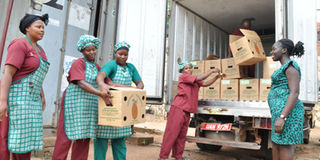Government, traders agree to stop exports to EU markets

Workers in a vegetable packaging company load packed fruits for export onto a truck. The country’s export promotion board cannot recruit new employees due to pending investigation. PHOTO BY Rachel Mabala
What you need to know:
Since February 2014, Uganda’s embassy in Brussels has been notifying the responsible ministries of the interception (harmful organisms) of plants and plant products exported from Uganda to various countries in the European Union (EU)
Kampala.
The two ministries of Trade and Agriculture have resolved to impose a self-ban on export of fresh fruits and vegetables to the European Union markets to control the spread of harmful organisms found in the produce exported.
The one-month ban, which began on Monday, was seconded by exporters of fresh fruits and vegetables, industry players who after several appeals convinced the two ministries to reduce the self-imposed suspension from the recommended three months to 30 days.
Since February 2014, Uganda’s embassy in Brussels has been notifying the responsible ministries of the interception (harmful organisms) of plants and plant products exported from Uganda to various countries in the European Union (EU).
The interceptions has affected a range of produce with the most affected ones being pepper, curry leaves, various fruits and vegetables and to an extent, flowers.
It is believed that nearly three quarters of the industry players have been victims of the interception and to get rid of it, a one-month self-imposed suspension was pronounced by Trade minister Amelia Kyambadde after consultation with State minister for Agriculture, Mr Vincent Bamulangaki Ssempijja.
The EU has indicated that the reason for the interception is the presence of harmful organisms in the produce from Uganda. The harmful organisms include the following: African Cotton Leaf worm, false codling moth, Trioza SSP and other organisms, including fruit flies.
If this matter is not solved urgently and comprehensively, the EU said it will impose a ban on those exports, a move that will cost the country an estimated loss of about $64 million (about Shs192 billion).
The ban would impact on the lives of farmers across the country. The coordinator of Uganda fruits and vegetable exporters and producers association, Ms Hasifah Tushabe, said the industry works with about 2.5 million farmers throughout the country.
According to the association’s chairman, Mr Thomas Yiga, the most affected will be the hot pepper farmers and exporters. Every week, nearly 40,000 tonnes of this product is exported to mainly the EU markets.
INSPECTION MEASURES
Strengthening inspection system. Only exports that have been certified will be allowed. There will strengthening of the inspection system at the airport on the basis of 24/7 operation.
Pack houses. Inspection at the farm level and at the pack houses will be undertaken, each of the exporters should indicate to the authorities in ministry of Agriculture their pack houses as these should be gazetted as points where the inspection takes place.
Certificate required. Each export consignment should be accompanied by or with a phytosanitary certificate and fast tracking of the rehabilitation of Entebbe Cold Stores ready for use by the exporters will be concluded.
Traceability system. Developing traceability system in which produce can be traced to the exporter and subsequently to the farm from which such produce should have originated, develop the sanctions and penalties systems for exporters in breach and strengthen the agricultural extension system.



